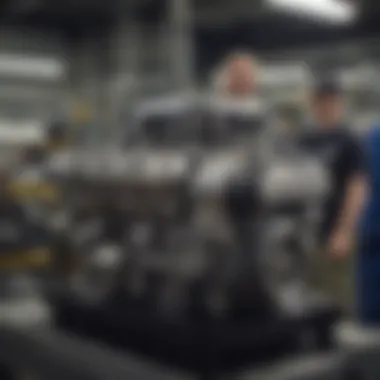Chrysler Trenton Engine Plant Jobs: Opportunities & Insights


Intro
The Chrysler Trenton Engine Plant stands as a vital component of the automotive sector, significantly influencing both employment opportunities and the local economy. This article delves into the range of jobs available at the plant, elaborates on the application process, and examines necessary skills and training offered to employees. Moreover, an exploration of its impact within the automotive industry provides a clearer context for potential job seekers and professionals alike.
Automotive Features and Innovations
In the evolving landscape of the automotive industry, innovation plays a crucial role in shaping employment prospects at the Chrysler Trenton Engine Plant. Keeping pace with technological advancements ensures a dynamic work environment.
Overview of Latest Technologies
At the Chrysler Trenton Engine Plant, an emphasis is placed on cutting-edge technologies that drive efficiency and performance. Workers engaged in engine production benefit from the implementation of advanced machinery and automation. Skills in operating precision tools and embracing newer manufacturing practices become essential for new hires.
In-Depth Look at Electric/Hybrid Vehicles
Electric and hybrid vehicles are at the forefront of Chrysler's production strategies. Understanding their design and operational requirements opens numerous job opportunities within the plant. Knowledge in battery technology and energy efficiency will be valuable for employees, allowing them to contribute to the future of sustainable automotive solutions.
Analysis of Autonomous Driving Systems
An increasing focus on autonomous driving systems enhances the skills being developed within the workforce. Workers are required to be skilled not only in basic engine mechanics but also in complex software systems that facilitate driver-less technology.
Evaluation of AI in Automotive Solutions
The utilization of artificial intelligence is transforming job profiles in the automotive sector. The integration of AI entails a deeper understanding of data analysis and smart technology applications in manufacturing processes. Skills related to AI-driven tools can be major strengths for prospective workers.
Trends in Automotive Industry
The current trends within the automotive industry encompass broader shifts that affect the workforce at the Chrysler Trenton Engine Plant. An evaluation of these trends provides insight into what prospects one might encounter in this arena.
Market Analysis and Forecasts
Analyzing market trends reveals a significant shift towards electric vehicles. The growing consumer preference influences job roles, emphasizing the need for proficiency in areas beneficial to production and development efforts.
Electric Vehicle Adoption Rates
With electric vehicle adoption increasing rapidly, employment sectors tied to battery production and maintenance will grow concurrently. Job seekers should prepare by acquiring knowledge in this area,
Growth of Ride-Sharing and Mobility Solutions
Ride-sharing technologies present unique challenges but also opportunities. Understanding car-sharing dynamics supports adaptive production strategies essential at the Chrysler Trenton Engine Plant.
Consumer Preferences Shifts and Impacts
As auto buyers become more environmentally conscious, these changing preferences spearhead new roles focused on sustainability within the plant's workforce. This evolution shapes hiring criteria and employee skill requirements moving forward.
Culmination
In summary, Chrysler Trenton Engine Plant plays a significant role in the local employment landscape, particularly in light of the trends and innovations emerging in the automotive sector. Job seekers stand to gain extensive opportunities by aligning their skill sets with the technological advancements and industry demands.
Insight: The focus areas mentioned above not only highlight the skills necessary for job applicants but also point towards a sustainable future for the automotive industry and its workforce.
Foreword to Chrysler Trenton Engine Plant
The Chrysler Trenton Engine Plant stands as a critical hub within the automotive landscape. Understanding its history and importance helps job seekers and industry professionals gauge potential career paths and developmental opportunities. This section aims to illuminate why the Trenton Engine Plant is significant not just for Chrysler, but for the wider automotive sector as well.
Background and History of the Plant


The Chrysler Trenton Engine Plant has a storied history that dates back to its establishment. Located in Trenton, Michigan, the plant began operations in the mid-20th century and has experienced various expansions and transformations since then. Initially built to meet growing demands for engine production, the plant has produced hundreds of thousands of engines annually. Over the years, Trenton has adapted to industry changes, embracing technological advancements.
As of now, the facility primarily focuses on manufacturing the Pentastar engine, which has become a centerpiece in many of Chrysler's vehicles. Its rich tapestry of innovations demonstrates not just durability and efficiency but also showcases the plant's commitment to maintaining high production standards. Additionally, its strategic location provides it an advantage, allowing access to vital supply chain routes and an available workforce in the greater Detroit area, renowned for its automotive heritage.
Importance to the Automotive Industry
The role of the Chrysler Trenton Engine Plant extends beyond mere manufacturing. It is a vital pillar of the automotive industry that influences local economies and the regional job market. By providing numerous job opportunities, the plant enhances community stability, thereby impacting overall regional growth.
Moreover, as Chrysler continues to fleet the Futur through innovations and deliveries of sustainably developed engines, Trenton plays a role by incorporating advanced engineering disciplines and methodologies. The facility embodies a commitment to quality and efficiency that resonates throughout the Chrysler corporation. This, in turn, sets a standard across the automotive field, pushing competitors toward their own operational improvements.
The Trenton Engine Plant is more than just a factory; it embodies the evolution of automotive technology and workforce development in Michigan.
In summary, grabbing a hold of the background and functions of the Chrysler Trenton Engine Plant is essential for understanding job opportunities within its walls. Whether you are seeking an entry-level position or have qualifications to fill more advanced roles, appreciating what this plant represents can inform your career decisions in the automotive industry.
Job Opportunities at the Trenton Engine Plant
Understanding job opportunities at the Chrysler Trenton Engine Plant is essential for those looking to embark on a rewarding career in the automotive industry. The plant is a significant player in Michigan's manufacturing sector, and it provides various positions that cater to different skill levels and professional backgrounds. These opportunities not only bolster the workforce but also contribute to the local economy, making it increasingly relevant to prospective applicants and current workers alike.
Types of Positions Available
The Chrysler Trenton Engine Plant offers a diverse range of employment options. Feaured among these are four main categories. Each sector necessitates unique skills and provides distinct career paths. These are:
- Manufacturing Roles
Manufacturing roles at the Trenton Engine Plant are pivotal in maintaining the assembly line's efficiency. These positions encompass assembling engines, conducting quality checks, and adhearing to safety protocols. Workers in these roles offer support in meeting production targets, building the engines that power Chrysler vehicles. The plant's state-of-the-art equipment aids in increasing production efficacy.
Key characterisitcs include: - Engineering Positions
Engineering positions have a significant impact on design processes and problem-soliving measures. Engineers working in this area focus on improving production methods and enhancing overall efficiency. They ensure each engine adheres strictly to required standards and regulations.
A notable element is: - Administrative Jobs
Administrative positions are crucial in overseeing day-to-day operations at the plant. Those in this category handle a range of responsibilities including HR management, bookkeeping, and coordination meetings. The key characteristic of this role is its necessity for strong organizational and communicational skills. Often, it provides a stable professional environment. Differences include: - Skilled Trades
Skilled trades roles are essential for maintaining machine functionality and operating high-tech equipement such as robotics used in manufacturing. Technicians offering services specialize in areas like welding, electrical work, and maintenance of machinery on-site. Hence, these positions help sustain productivity and ensure smooth operations throughout the plant.
Features state include:
- Teamwork: Working closely with other employees on the assembly line.
- Physical Demands: Jobs often entail heavy lifting and repetive tasks, suitable for those who thrive in dynamic settings.
- Career Growth: Welcoming those new to manufacturing or experience workers, with various training oppurtunities available.
- Innovation: Engineers are encouraged to bring fresh ideas and solutions for refining products devleoped within the plant.
- Interdepartmental Collaboration: Works across departments to ensure alignment in operational strategies.
- Flexibility: Different office hours may provide enhanced work-life balance compared to production shifts.
- Career Path: Procpects for growth into middle or upper management are possible over time with experience.
- Expertise: These positions typically require specialized training and certifications, increasing job desirability.
- High Job Security: Skills demanded in trades are often hard to find, ensuring contestants are likely to obtain stable employment.
- Frontline Problem Solver: Being on-site technicians is crucial for addressing immediate machine issues.
Entry-Level vs.
Experienced Positions
When examining job opportunities at Chrysler, it is essential to discern between entry-level and experienced positions. Entry-level roles are usually available across various sectors, providing novices exposure to working labor. They offer the chance to gain skills while contributing to the team's overall success. Often a low bar for entry, they provide accessible opportunities for fresh graduates or those reconsidering sintering careers.
On the other hand, experienced positions do come with more demanding responsibilities. Professionals are expected to have in-depth expertise to potentially undertake leading roles in organizational management. These job types ascertain individual contributions are aligned with the organization’s long-term goals. Companies often take on seasoned veterans due to their effectiveness at satisfying complex tasks and meeting heightened production expectations.
Whichever category one chooses to pursue, both offer considerable value in shaping a fulfilling career at the Chrysler Trenton Engine Plant.
Application Process for Employment
The application process for employment at the Chrysler Trenton Engine Plant is crucial for both job seekers and the plant's operational needs. Understanding this process helps potential candidates present their qualifications effectively and increases their chances of employment. A well-structured application approach reinforces the importance of attention to detail, which is highly valued in the automotive industry.
How to Apply
Online Application Procedure
The online application procedure serves as a central pathway for submitting job applications to the Chrysler Trenton Engine Plant. One key charateristic of this method is its accessibility, as it enables candidates to apply from various locations. Online systems streamline the application process, reducing the likelihood of manual errors and improving processing speed.
A significant unique feature of the online application is the ability to track the application's status in real-time. This transparency benefits candidates, allowing them to stay informed about progress. However, the procedure can be challenging for individuals uncomfortable using technology or those without internet access, limiting their opportunities.
In summary, the online application procedure is a beneficial tool in this regards, offering efficiency and accessibility, while also necessitating tech proficiency from applicants.
Resume and Cover Letter Tips


Resume and cover letter tips provide insights crucial for crafting convincing application materials that reflect candidates' qualifications. A core value of these tips lies in their emphasis on customization. Tailoring application documents to match specific job descriptions is a well-regarded practice that significantly increases interview chances.
An important unique feature of effective resumes and cover letters is the inclusion of quantifiable achievements and results. This approach creates a strong impression on recruiters who review many applications daily. While formatting requires careful attention, an attractive yet clear presentation remains pivotal.
This guidance brings clarity to the sometimes-overwhelming application process, equipping candidates with skills necessary to stand out distinctly in a competitive job market.
Interview Process
Navigating the interview process at the Chrysler Trenton Engine Plant is a vital step for candidates who reach this stage. The interview format may vary but consistently focuses on assessing skills directly related to the job, alongside soft skills like communication and problem-solving.
Understanding the various types of interviews—such as behavioral or technical—is beneficial. Being prepared can help candidates showcase their best attributes effectively, leaving a positive impact on interviewers.
Skills and Qualifications Required
In the dynamic environment of the Chrysler Trenton Engine Plant, having the right skills and qualifications is crucial for both individual success and operational efficiency. The automotive industry is competitive and constantly evolving. Job seekers must demonstrate not only technical competence but also interpersonal abilities that facilitate teamwork and problem solving.
Technical Skills Needed
Technical skills are fundamental in various positions at the plant. These include:
- Machinery Operation: Familiarity with equipment such as CNC machines and assembly lines. Understanding how these machines work ensures that employees can execute tasks effectively and safely.
- Quality Control: Knowledge in assessing product quality helps maintain high industry standards. Skills in this area involve precision and attention to detail.
- Engineering Fundamentals: For engineering roles, a solid grasp of engineering principles, materials science, and design is vital. Degrees or certifications in mechanical or electrical engineering can be beneficial.
- Safety Protocols: Understanding OSHA regulations and safety procedures is crucial in a manufacturing setting. This knowledge helps prevent accidents and ensures a safe working environment.
Having these technical skills not only helps in daily tasks but also enhances the overall performance of the manufacturing process. Without these, individuals may struggle to meet the demands of the job.
Soft Skills for Success
While technical capabilities lay the groundwork for operational tasks, soft skills determine how well individuals collaborate and communicate within teams. Important soft skills for the Trenton Engine Plant include:
- Communication: Clear communication ensures that teams function effectively. It’s essential for relaying complex information swiftly and accurately.
- Problem-Solving: The ability to think on your feet when challenges arise can greatly influence productivity. Analytical thinking plays a large role here.
- Adaptability: The automotive sector often introduces new technology. Workers who easily adapt to these changes can significantly contribute to innovation at the plant.
- Team Collaboration: Being part of a larger team means cooperation is critical. Workers who can engage actively in teamwork create a more harmonious work environment.
Training and Development Opportunities
Investing in the workforce is crucial for any organization, and the Chrysler Trenton Engine Plant is no exception. Training and development opportunities not only uplift the employee experience but also enhance the overall productivity of the plant. Specifically, robust training programs equip employees with the skills they need to perform their jobs successfully. They can also boost job satisfaction and retention, making the company an employer of choice in the regional automotive sector.
On-the-Job Training Programs
At Chrysler Trenton, on-the-job training is a cornerstone of employee development. This program ensures that workers gain practical experience right from the start. Employees learn directly from experienced professionals within a real-world environment. This method leads to an immediate understanding of equipment and procedures, which is often faster than traditional training methods. Workers habituate to the workflow, safety guidelines, and quality standards essential to the automotive industry.
Additionally, by integrating theory with practice, employees maximize their learning efficiency. The program benefits various categories of employees, from production line workers to advanced technicians. On-the-job training reduces the learning curve and helps employees build confidence.
Skills Enhancement Initiatives
Skills enhancement initiatives reflect Chrysler's commitment to cultivating a capable workforce. These initiatives frequently change based on evolving technology and industry standards. Regular assessments are made to identify skill gaps, followed by targeted training sessions.
Some key areas of focus include:
- Advanced Manufacturing Techniques: To stay competitive, ensuring familiarity with cutting-edge production methods is vital.
- Safety Protocols: Safety is paramount, and ongoing training aligns with evolving regulations and new equipment implementation.
- Quality Control: Understanding quality assurance methods is essential to meet the high standards expected in the automotive sector.
Participating in skills enhancement initiatives not only makes employees more competent but also contributes to their career advancement opportunities within the company. Employees positioned in advanced functions tend to enjoy advantages in salary and benefits, creating a more motivated workforce.
Considering that employees equipped with modern skills will navigate future challenges better, such initiatives indirectly support the long-term goals of the Chrysler Trenton Engine Plant and its community impact.
In summary, training and development opportunities are fundamental to maintaining a skilled workforce at Chrysler Trenton. On-the-job training effectively integrates traditional and practical learning, while skills enhancement initiatives ensure the workforce remains adept in a rapidly changing environment.
Impact on Local Economy
The Chrysler Trenton Engine Plant plays a pivotal role in the local economy. Understanding this impact involves careful examination of the plant’s contributions to employment figures and its support for surrounding businesses. The presence of such an industrial facility creates waves of positive economic effects, benefiting the community on various levels.


Job Creation and Unemployment Rate
The Trenton Engine Plant is a significant contributor to job creation in the region. With numerous positions, ranging from manufacturing to skilled trades, the plant employs a diverse workforce. This employment provides individuals and families with a steady income source, which in turn stimulates the local economy.
A higher employment rate leads to increased consumer spending within the community. When people have jobs, they spend more in local stores, restaurants, and service providers. Such patterns contribute to reducing the overall unemployment rate. In areas connected closely with manufacturing and production, prosperity often follows. Economic health becomes aligned with job availability as more people are able to contribute financially.
A highlight here is the plant’s responsiveness to economic shifts. When demand for engines rises, there are often increases in hiring. This agility can abruptly change the economic climate in a small community, making it resilient. Even during downturns in the auto industry, some individuals may find alternative roles related to automotive technology or supply chains, giving them opportunities to transition without completely leaving the industry.
Support for Local Businesses
The economic effect of the Chrysler Trenton Engine Plant extends beyond direct employment. Local businesses benefit significantly from the plant's presence. Employees of the plant require services—ranging from cafés to auto repair shops. As these workers frequently visit local establishments, the operation creates continual patronage.
Furthermore, suppliers of parts and materials often develop networks with the plant, fostering even more economic resilience. Small to medium enterprises thrive partly due to the steady flow of contracts and purchases happening as a result of the plant's requirements in its production processes.
Additionally, landscaping services, cleaning companies, and maintenance businesses also get business from the plant complex. The relationship between the facility and local firms cultivates a supportive local economy bolstering the entire community structure.
In sum, the Trenton Engine Plant fosters an environment ripe with job opportunity while fortifying local economic character and interaction.
Each position and contract reaches beyond gcdirect correlation with the output only; it invigorates an entire network of relationships within the Trenton community. Polishing these connections creates a healthy, stable economic ecosystem crucial for long-term growth. As the local economy strengthens, it lays down a foundation for continuous development influenced by the presence of the Chrysler Trenton Engine Plant.
Future Prospects for Employment
Future prospects for employment at the Chrysler Trenton Engine Plant play a crucial role in understanding the evolving landscape of the automotive industry. As technology advances and market demands change, the opportunities available for job seekers will also transform. Analyzing these trends provides valuable insights for prospective employees and industry professionals looking to stay informed about potential career paths.
Technological Advancements in the Industry
Technological advancements in the automotive sector greatly influence the type and number of jobs available at manufacturing plants like Trenton. The integration of artificial intelligence, robotics, and automation is reshaping how companies function. These advancements can lead to the creation of roles focused on monitoring and maintaining complex machinery. Moreover, positions demanding knowledge of software development for automobile systems are becoming more common. Job seekers will need to display adaptability and a readiness to learn new skills to thrive in this changing environment.
- Areas of Impact:
- Automation: Increases efficiency but requires skilled technicians for oversight.
- Artificial Intelligence: New roles emerge for data analysis and machine learning specialists.
- Vehicle Electrification: Opportunities expand in battery manufacturing and electric vehicle technology.
For automotive enthusiasts, these developments signal a new era of collaboration between engineering and technology. It highlights the need for constant skill enhancement to align with industry demands.
Expansion Plans for the Trenton Plant
The Chrysler Trenton Engine Plant has ambitious expansion plans that can significantly influence employment opportunities. As the plant evolves, it aims to increase its production capacity, possibly leading to hiring drives in various departments. Such growth motivations could derive from a surge in market demand for new vehicle models. Mores specifically, increased lineup of electric vehicles may enhance the need for engine production.
- Potential Benefits of Expansion:
- Job Creation: The plant could add new roles, particularly in engineering and skilled trades.
- Economic Stability: New hiring can help lower regional unemployment rates.
- Retention of Core Skills: The facility may focus on training existing employees for new roles rather than depending solely on outside hiring.
Investment in facility upgrades might range from enhanced machinery to environmentally-friendly production techniques, addressing both demand for better engines and raised sustainability expectations.
Through advancements and expansion, the Trenton Engine Plant's future looks promising. Prospective employees should start preparing today to take advantage of coming opportunities.
Ending
The conclusion provides an essential overview of the key points discussed throughout the article on the Chrysler Trenton Engine Plant. This section synthesizes crucial elements, offering insights benefits, and considerations that resonate with the information presented earlier.
Summarizing Key Points
The article outlined significant points regarding the Chrysler Trenton Engine Plant's job structure. This includes:
- Various Job Opportunities: The plant hosts a range of roles, including manufacturing, engineering, and administrative positions. Each offers unique challenges and rewards.
- Application Process: The detailed guide for candidates emphasizes clarity on how to apply for jobs, providing essentials to position themselves as strong applicants.
- Local Economic Impact: The Chrysler Trenton Engine Plant plays a significant role in job creation. This directly correlates with the local economy's growth and lowers the unemployment rate.
- Skills Required: A combination of technical and soft skills is essential for success in the manufacturing sector. Familiarity with industry standards often provides candidates a competitive edge.
- Future Growth: Technological advancements and expansion plans at the Trenton plant indicate sustainability and increased recruitment opportunities in the coming years.
Final Thoughts on Career Opportunities
In providing insightful analysis about job opportunities at the Chrysler Trenton Engine Plant, the article serves not only job seekers but also industry aficionados. Analyzing the role of such major plant operations offers cadidates a lens into the automotive workforce landscape.
While it is crucial for potential employees to be well-equipped with the knowledge of skills needed, ongoing economic impacts and future advancements in technology will shape their careers in significant ways. The insights learned throughout, such as the application techniques and the significance of adaptability, hold immense value. Keeping abreast of such factors helps participants remain competitive in an ever-evolving industry.
The Chrysler Trenton Engine Plant stands as a beacon of opportunity for those wanting to explore the field of automotive production. With strong considerations given to skills, training, and the community impact, potential employees can align themselves strategically for fruitful careers ahead.







